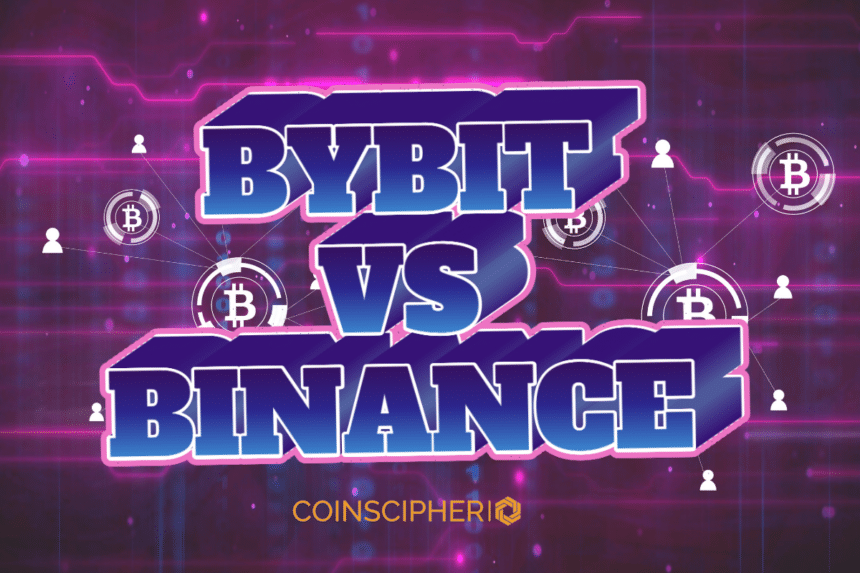With the rise of cryptocurrency trading, Bybit vs Binance have emerged as two leading crypto exchange platforms. This article provides a detailed comparison of these exchanges to help determine the best option.
Summary
Bybit and Binance both offer robust feature sets for trading cryptocurrencies. Our analysis gives Bybit a slight edge overall due to its transparent holdings, no-KYC policy, and superior mobile app. While Binance remains very popular for its large selection of trading pairs and order types, Bybit’s 100x leverage, weekly World Series of Trading events, and comprehensive learning resources make it a strong competitor.
Read on for a full breakdown of how these exchanges compare across key areas like fees, security, supported countries, and more. In the end, either platform is a sound choice – but Bybit may be a better fit if you prioritize privacy or advanced trading tools.
New users can claim a sign up bonus of up to $600 when registering for Bybit today. The bonus program rewards you for completing tasks like depositing funds and placing trades. So there’s never been a better time to try Bybit and experience their top-rated exchange platform for yourself.
Platform Details
Bybit is the largest cryptocurrency derivatives exchange in the world, with over 2 million users. Based in Singapore, it was founded in 2018 and quickly gained popularity for its highly competitive trading fees and wide choice of coins. Bybit offers spot trading as well as perpetual contracts, futures, and options with up to 100x leverage. Our rating is 5/5 based on extensive research and positive user reviews.
Binance needs little introduction – it’s consistently ranked the top crypto exchange by trading volumes. Founded in 2017, Binance handles over $2 billion in daily trades and provides spot and futures markets. With support for hundreds of digital assets and 24/7 customer service, Binance rightfully enjoys a stellar reputation in the crypto community. Our rating is also 5/5 for this industry-leading platform.
Bybit vs Binance: Feature Comparison
Trading Tools and Services
Bybit offers perpetual contracts, futures, options, and spot trading across 400+ coins. Their futures contracts include a wide variety of expiry dates and deliverable coins. Bybit also leads the space with leveraged tokens and up to 100x leverage on select markets. Other unique features include the Bybit Earn service for lending crypto assets.
Binance leads in the spot trading space with support for hundreds of coins and trading pairs. However, they max out leverage at 125x compared to Bybit’s 100x. Binance earns points for its futures, margin, and options markets too. Both exchanges provide powerful charting tools and order types like limit, market, and stop orders.
Mobile App
Bybit’s mobile app boasts a clean interface and all core trading features like margin, futures contracts, order placement, and customizable watchlists. Users praise its simple navigation and dark mode support. Ratings average 4.8/5 stars on both iOS and Android stores.
Binance also delivers a well-designed trading experience on mobile. However, the app lags behind Bybit in terms of additional features and functionality for advanced strategies. Binance averages 4.6 stars for its mobile versions.
Community Resources
Bybit stands out with its educational resources like webinars, video tutorials, and the Bybit Learn portal – an encyclopedia of trading knowledge. They also host the popular World Series of Trading competition weekly.
Binance offers community forums and articles on using their platform. However, their educational tools could be more robust compared to Bybit’s extensive learning center resources.
Bybit offers a deeper collection of unique trading tools and leads in terms of community support and learning opportunities for both beginners and pros. Their mobile app is also more full-featured.
Fee Structure
Bybit charges a standard taker fee of 0.075% and a maker rebate of 0.025% across all trades. Withdrawal fees range from 0.0004 BTC to 0.1 BTC depending on the coin. Deposits are free in all supported currencies.
Binance has a competitive 0.1% taker fee and 0.75% maker rebate. Withdrawal fees vary per coin but are usually less than $10. Deposits also have no associated costs on Binance.
Both exchanges have very low fee structures overall. Binance edges out Bybit by a tiny margin for active traders due to marginally lower costs.
Security and Regulation
Bybit employs bank-grade security systems like cold storage and multi-factor authentication. They have never experienced a breach or hack. Bybit is not regulated but adheres to best practices. They publish regular proof-of-reserves audits demonstrating a 1:1 backing of user funds.
Binance is regulated in some jurisdictions like Europe and follows Know Your Customer practices. Security measures include PIN codes, whitelisted addresses, and two-factor authentication. However, Binance has faced some regulatory issues and does not offer proof-of-reserve audits for transparency into holdings.
Bybit scores higher for its complete transparency into reserves as well as its no-KYC policy protecting user privacy. Both exchanges maintain very strong security overall.
Customer Support
Bybit provides around-the-clock live chat, email ticket support, and a dedicated support center on their website. Representatives are available in over 30 languages. The Bybit Help Center hosts an extensive knowledge base too.
Binance also delivers 24/7 support via live chat, email tickets, and an active help center. Language options include English, Chinese, Russian, and Korean. However, support availability is less diverse internationally compared to Bybit.
Bybit offers superior local language help thanks to its multilingual customer support team operating in over 30 languages worldwide.
Supported Countries
Bybit currently serves users in over 180 countries globally due to their non-regulated status. This wide international reach is a major advantage.
Binance is available in over 100 countries but withdraws services from jurisdictions with strict regulations like the United States. Support depends on localization and approvals.
Bybit wins for the greatest geographical coverage worldwide without limitations for most countries.
User Experience
Bybit employs a clean and intuitive crypto exchange interface across all devices. Order books, charts and market data are clearly displayed. Bybit also publishes how-to guides and video tutorials for navigating advanced order types easily.
Binance sports a similarly polished user interface that most find easy to use. Navigation is straightforward between spot, margin and futures trading interfaces. Educational resources provide training for charting and strategies.
Both exchanges deliver exceptional user experiences overall. Binance may offer slightly more order types to explore initially versus Bybit.
Community and Reviews
Bybit hosts a vibrant community on platforms like Telegram and Reddit to complement their learning center resources. User reviews consistently praise Bybit’s reliability, low fees, and futuristic features.
Binance enjoys one of the largest crypto communities globally thanks to its enormous scale. However, regional community support for Binance can vary outside core markets like China and Europe.
While Binance naturally has a larger following overall, Bybit receives strong positive sentiment within the core trader community for constant product innovation.
Final Thoughts
In summary, both Bybit and Binance establish themselves as leading crypto exchanges by virtue of robust feature packages, competitive fees and solid security practices. For most active traders seeking a versatile trading platform, either Binance or Bybit would suit their needs well.
However, Bybit claims a technical edge overall through its highly transparent account reserves, no limits on coin listing or leverage, and extensive educational tools. Their priority on privacy with non-KYC also appeals to some users. The many bonuses offered through Bybit’s affiliate program also sweeten the deal for new signups.
While Binance remains king of the crypto space for trading volume and a variety of pairs/markets supported, advanced traders may find Bybit a more full-featured platform overall. Ultimately, either exchange is a wise choice – but Bybit gets a slight nod in this detailed comparison of features. Give their platform a try today and unlock signup bonuses worth up to $600 by exploring all it has to offer.
FAQS
Which is better Bybit or Binance?
Both Bybit and Binance are excellent options for cryptocurrency trading. While Binance has greater trading volumes and supports more coins/pairs, the article gives a slight edge to Bybit due to its transparent account reserves, no KYC policy, higher leverage limits, extensive educational resources, and competitive fees. However, either platform is a sound choice depending on your individual needs.
Is Bybit still safe?
Yes, Bybit is still considered a very safe exchange. According to the article, Bybit employs bank-grade security systems like cold storage and multi-factor authentication. They have never experienced a breach or hack. Bybit also enhances transparency by regularly publishing proof-of-reserves audits demonstrating a 1:1 backing of user funds.
Is it safe to buy crypto on Bybit?
Yes, the article indicates that buying cryptocurrencies on Bybit is generally safe due to the high security standards and controls they have in place. Bybit adheres to best security practices even though they are not regulated in certain jurisdictions. As long as strong password protection and account verification is used, crypto purchases through Bybit pose no greater risk than other major exchanges.
Why do people use Bybit?
Some key reasons people may prefer using Bybit according to the article include its transparent account reserves, no need for KYC verification protecting privacy, highly leveraged trading up to 100x, extensive educational resources, global availability without country restrictions, frequent signup bonuses and affiliate rewards, and sophisticated trading tools. The combination of features makes Bybit appealing for both beginners and advanced traders.




